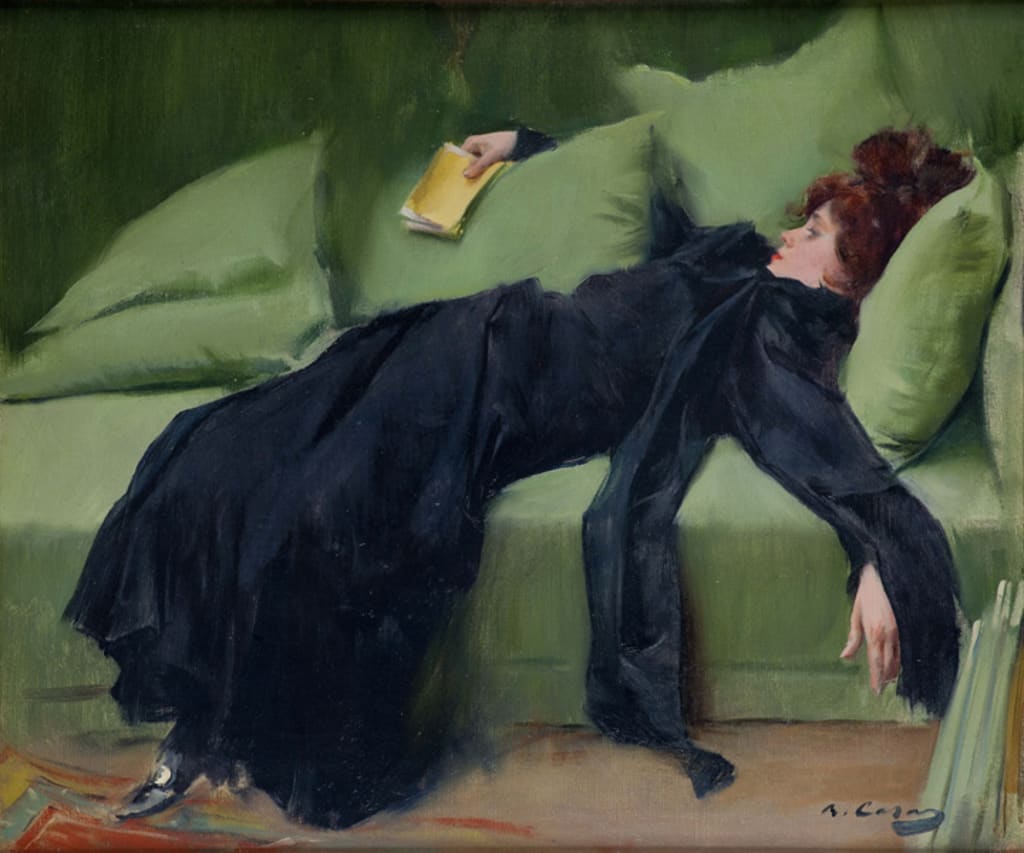Have you been defeated by your own mind? Life is difficult for many, but according to psychologists, it is you who needs to change.
Do You Need to Change Yourself?

I touched my skull - just right behind the ear - and found the texture discomforting. Am I getting dandruff again? So, I try probing better, peeling away to reveal (or create) a rush.
The Joven Decadente is a painting of a woman exhausted after having danced too much. Needless to say, I did not interpret it correctly the first time I saw it, half an hour ago. Interesting as fainting by dance is a common feature of the folklore of Puglia, where I 'come from'. But I digress. Possibly influenced by the topic of the video where I saw the painting, and projections from my own life experiences, I thought the painting was about a woman so pressed by life that she fell under its weight. In other words, a depressed, lost in existential thoughts, young woman. Indeed, I have found myself in such positions many times.
The painting, and the last part of the video - The Hunger, by ContraPoints, real name Natalie Wynn - came at a very ideal moment in my life as they are representative of my internal struggles, as well as in line with the question posted by Sadie Seroxcat in her prompt about life and changes.
Sadie writes:
"Think about where you are now in your life; where the world/your country is, those you love, things you love and are important to you - how everything stands at this moment. Then think about Change, Transition - the situation as it is right now and how we got here; how things have changed and developed; how they will (should or could) move forward; how you feel about the future; or what you would like to see."
Life changes, society changes, and the world changes (environmentally for the worse it seems, because of humans). The mind too changes, adapting or maladapting to the needs of the environment and of "the soul".
It is no secret that I do not react well to big changes, as well as responsibilities, and routines. Long-term routines. But I'm starting full-time work soon.
Not sure I like the term per se, as I think it is much more complex than a "condition" or "disorder", but I recently discovered that many feel the way I do about work. Terror. They call it Ergophobia. From personal stories I gathered that while it is different for many, several people do feel the way I do and experience what I experience too: existential fear of wasting my life spending it doing one thing, social fears, bad reactions to negative feedback, problems related to ADHD, and so forth. But unfortunately, we do live in this world, and I have made peace with the idea that this (working) has to be done. It has to happen.
Now, while I see the point of seeing this as a problem that needs resolving - especially from the perspective of having to feed oneself and contribute to society in exchange for money - it does prompt the question: are individuals always the ones responsible for changing?
When it comes to the environment and contexts of other "disorders", why do psychologists emphasise the need for the individual to change and not the society that creates the individual's problems?

Devastating Lies About Your Mind
In I'm a psychologist - and I believe we've been told devastating lies about mental health, Sanah Ahsan argues that the way that society views mental health concerns is placing the blame on the individual while dismissing the politics of their suffering.
The general argument states that we live in a world where it often makes sense that people are increasingly considered mentally ill.
For example, climate change is becoming so severe that we fear for future generations; we are experiencing pandemics; even without pandemics, loneliness and isolation are increasing; and forces such as the police continue to murder black people simply for being black. Not to mention the rise of alt-right movements.
However, most individual psychotherapies are still focused on the way people experience such events, often even based on the idea that we have "irrational" responses to the environment, or wrong ways of thinking.
Ahsan writes:
"Will six sessions of CBT, designed to target "unhelpful" thinking styles, really be effective for someone who doesn't know how they're going to feed their family for another week? Antidepressants aren't going to eradicate the relentless racial trauma a black man is surviving in a hostile workplace, and branding people who are enduring sexual violence with a psychiatric disorder (in a world where two women a week are murdered in their own home) does nothing to keep them safe. Unsurprisingly, mindfulness isn't helping children who are navigating poverty, peer pressure and competitive exam-driven school conditions, where bullying and social media harm are rife."
The psychologist's point is that we, and especially mental health advocates, need to focus also on changing the system that is to blame for mental illness.
I agree. Though I do of course see the usefulness in therapy and helping people cope with life while things don't get better.
However, the article did make me think about the relativeness of many disorders. See, using scientific terms and labels creates an aura of objectivity around these issues. But, there is a case in which these terms and practices may increase the stigma of the diverse.
Am I wrong and objectively irrational for not wanting to work? Is it ok to think that everyone who doesn't fit in the way society works should be considered to have a disorder? For example, people who dismiss others (I'm not talking about hurting others) and put themselves first above friends and family.
This is not to say that the person who experiences "symptoms" can't ask for help.
It is from certain angles, a philosophical problem. If we also consider linguistics, the term disorder is very telling: disrupting order. That would appear to explain why, at certain points in time, homosexuality (as well as other feelings and behaviours that would now describe any member of the LGBTQ+ community) was considered a mental disorder. The same stigma was posed upon women who wouldn't fit the role they were expected to play.
To make it worse, while many of these disorders were categorised to describe people who didn't fit in their societal roles (again, I'm not talking about psychiatric conditions such as schizophrenia), the categorization itself augmented the stigma towards people who didn't fit. After all, there was a scientific term to describe such people.
As far as modern time goes, I wonder if conditions such as ADHD and ADD aren't thought of in similar ways. Sure, it is different in the way in which the inherent symptoms of the "condition" may create discomfort for the individual when they won't allow the individual to function according to daily needs (mostly ascribed by society: focus, work, etc).
While I am not a big fan of the reasons why therapies such as Cognitive Behavioural Therapy exist (change your way of thinking and how you behave instead), I do see their usefulness, especially until better solutions are developed. What I'm trying to do here is stimulate thoughts that do not take the Psychology system as perfect, or always based on the strongest of premises.

Especially in the cases discussed in, I'm a psychologist - and I believe we've been told devastating lies about mental health, thinking of the individual as the carrier of the problem may continue leaving people in the pain and void lived by 'Tiffany Tumbles' as played by Natalie Wynn in Hunger.
"In efforts to destigmatise mental distress, "mental illness" is framed as an "illness like any other" - rooted in supposedly flawed brain chemistry. In reality, recent research concluded that depression is not caused by a chemical imbalance of the brain. Ironically, suggesting we have a broken brain for life increases stigma and disempowerment. What's most devastating about this myth is that the problem and the solution are positioned in the person, distracting us from the environments that cause our distress. […]. Instead of trying to change "mindsets" in therapy, we need to change race- and class-based hierarchies, the housing and economic system. Universal basic income has psychological benefits, and recent studies show how it improves the "crises of anxiety and depression"."- Ahsan
I'm unsure if I agree with the idea that mental health workers are also responsible for social change, but I do believe that if they were, more holistic and complete work towards mental health would be advanced.
I'm here as usual more to create doubt than to give answers.
Life changes, it's a cycle, and society's life too goes through changes, and we can be agents working to direct changes for the better. Better, in my vision, being towards inclusivity, and equality above all else, with all that this entail.

None of this is to dismiss the value of one-on-one therapy (that's part of my job, after all). But therapy must be a place where oppression is examined, where the focus isn't to simply reduce distress, but to see it as a survival response to an oppressive world. And ultimately, I'd like to see a world where we need fewer therapists.






Comments
There are no comments for this story
Be the first to respond and start the conversation.